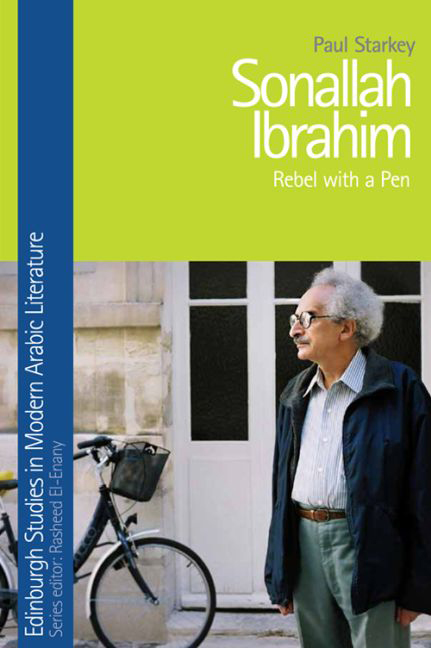Book contents
- Frontmatter
- Contents
- Series Editor's Foreword
- Preface
- 1 Introduction: Background and Context
- 2 Rebel with a Pen
- 3 Cairo Prison: Tilka al-raʾiha (1966)
- 4 Michelangelo and the Dam: Najmat Aghustus (1974)
- 5 CocaColaland: al-Lajna (1981)
- 6 War in Lebanon: Bayrut, Bayrut (1984)
- 7 Consumer Society: Dhat (1992)
- 8 Prison of Dishonour: Sharaf (1997)
- 9 Widening Horizons (1): Sex, Memory and Revolution: Warda (2000)
- 10 Widening Horizons (2): In the Land of the Capitalists: Amrikanli (Amri Kan Li) (2003)
- 11 Return to Childhood: al-Talassus (2007)
- 12 The French Connection: al-ʿImama wa-al-Qubbaʿa (2008) and al-Qanun al-Faransi (2008)
- 13 Filling a Gap: al-Jalid (2011)
- 14 Epilogue
- Bibliography
- Index
12 - The French Connection: al-ʿImama wa-al-Qubbaʿa (2008) and al-Qanun al-Faransi (2008)
Published online by Cambridge University Press: 23 September 2017
- Frontmatter
- Contents
- Series Editor's Foreword
- Preface
- 1 Introduction: Background and Context
- 2 Rebel with a Pen
- 3 Cairo Prison: Tilka al-raʾiha (1966)
- 4 Michelangelo and the Dam: Najmat Aghustus (1974)
- 5 CocaColaland: al-Lajna (1981)
- 6 War in Lebanon: Bayrut, Bayrut (1984)
- 7 Consumer Society: Dhat (1992)
- 8 Prison of Dishonour: Sharaf (1997)
- 9 Widening Horizons (1): Sex, Memory and Revolution: Warda (2000)
- 10 Widening Horizons (2): In the Land of the Capitalists: Amrikanli (Amri Kan Li) (2003)
- 11 Return to Childhood: al-Talassus (2007)
- 12 The French Connection: al-ʿImama wa-al-Qubbaʿa (2008) and al-Qanun al-Faransi (2008)
- 13 Filling a Gap: al-Jalid (2011)
- 14 Epilogue
- Bibliography
- Index
Summary
Exceptionally, this chapter will consider not one but two of Sonallah Ibrahim's works, al-ʿImama wa-al- Qubbaʿa (The Turban and the Hat; 2008) and al-Qanun al-Faransi (The French Law; 2008), which appeared in close succession, and are not only linked by their thematic material but also provide a new twist to the intertextual thread that runs through the author's works.
Publication and Translations
The first work, al-ʿImama wa-al- Qubbaʿa, was completed in December 2007, the same year that marked the publication of al-Talassus and around four to five years after the publication of his last major novel, Amrikanli; the work was published in Cairo the following year, 2008, by the author's favourite publishing house, Dar al-Mustaqbal al-ʿArabi. The second work, al-Qanun al-Faransi, appeared shortly afterwards from the same publishers. A French translation of al-ʿImama wa-al- Qubbaʿa by Richard Jacquemont was published in 2011 as Turbans et Chapeaux; to my knowledge, there are no English or other foreign-language translations of either work.
Background
The main historical background to the two works is centred on Napoleon's invasion of Egypt in 1798, and the subsequent three-year French occupation, which for many Egyptians represented their first opportunity to become acquainted with European civilisation at first hand; the date has traditionally, at least until recently, been used as a starting point for accounts of both general and literary histories of the modern Middle East. As already remarked, although the French invasion was essentially an episode in French–British imperial rivalry and the subsequent occupation short-lived, it undoubtedly marked a turning-point both in cultural relations between Europe and the Arab world and in the political development of Egypt itself. More particularly, on a cultural and educational level, the occupation saw a number of developments that laid the groundwork for significant innovation during the nineteenth century. These included the importation of a printing press; the publication of a newspaper, Le courier de l’Égypte, and a journal, La décade égyptienne; and the founding in Cairo of a scientific institute, together with a comprehensive survey of all aspects of the country, subsequently published as the multi-volume Description de l’Égypte. A number of these developments are referred to, explicitly or implicitly, in Sonallah Ibrahim's two novels under discussion.
- Type
- Chapter
- Information
- Sonallah IbrahimRebel with a Pen, pp. 189 - 204Publisher: Edinburgh University PressPrint publication year: 2016



